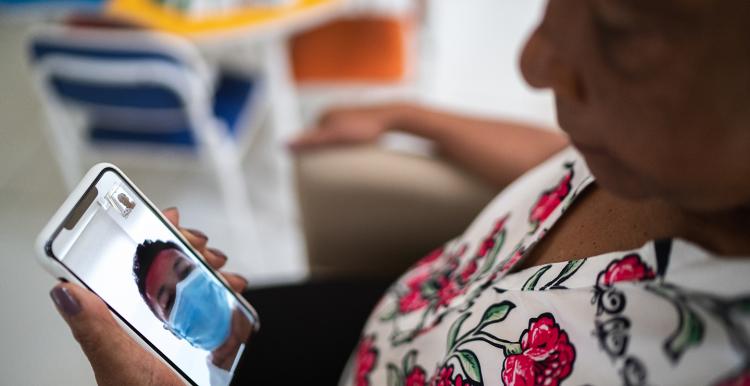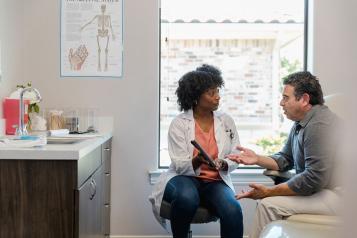The NHS is open: Whittington Health talk to us about hospital appointments and visits

This has been a challenging year full of uncertainties, but it is more important than ever that we know how to access health services when we need them. Staff from the Whittington spoke to us about new ways to access hospital services. They also answered questions from local residents.
This information was provided for our 30 September event, 'What will it be like visiting hospital now?' Details may change over time so for the most up to date information go to the Whittington Health website.
Video appointments at the Whittington
'Attend Anywhere' is the name of the video appointment system that the hospital is using. To access the appointment you follow the hyperlink (clicking this takes you to the right place on the internet) provided in your appointment letter. You then need to enter your first name, last name, date of birth and a phone number in case the video fails. This personal information is not retained by the system once the appointment is over.
You will then find yourself in a virtual waiting room for the clinic and told where you are in the queue. You wait here until the clinician starts your appointment.
Questions about video appointments:
- Can you attend Podiatry appointments via Attend Anywhere?
For podiatry it depends on the nature of the appointment. It may not be appropriate to have a video consultation. However, you can show the clinician things on the camera. It is a clinical decision that decides whether it is appropriate to offer a video appointment. You can book a face to face appointment if it's required. - What about people who do not have a digital device?
We are aware that this is an issue. However, more people have been able to access video appointments across Islington and Haringey than we thought, especially across most of the age ranges etc. However, for some people accessing video appointments just won’t be possible and they will be offered either a phone appointment or a face to face appointment. - How does the information from the consultation get embedded into the patients record?
This is still done as usual. The video appointment is not recorded, and the system itself doesn’t record any information, but clinicians will record the details in the same way as usual and will write in your records. - Can patients record the information shared in the appointment?
You can’t currently record the video appointment, but you can have a family member or carer with you for the appointment. As is currently done with face to face and telephone appointments, clinicians will write a record of the appointment and outline next steps in a letter which you and your GP should receive. - Is interpreting available?
This system also allows interpreters to attend more easily. For example, it has worked well with Deaf patients having a British Sign Language interpreter also join the video appointment.
Outpatient appointments at the hospital: what to expect
- Your temperature is taken at the hospital entrance.
- Staff members wear PPE (personal protective equipment). Patients and visitors wear masks. Hand gel and wipes are readily available.
- So that social distancing can be observed, there are reduced numbers of people in the hospital waiting areas. The waiting areas have seats according to capacity, depending on the size of the area.
- Patients are encouraged to attend appointments on their own.
- One-way flow of traffic in corridors, and signage to keep people aware of social distancing.
- Protective screens are present where appropriate.
- Letters inform clients as to whether they have a face to face or virtual consultation.
Day treatment centre and pre-assessment: what to expect
- The changes made to ensure these services are safe are very similar to those made in Outpatients.
- Theye are now doing many telephone appointments but are still doing face to face appointments when needed.
- Patients are still coming in for pre-op tests and a Covid test 72 hours before their surgery.
- Patients can be accompanied by 1 person to their appointments with 3 people being the maximum number in a room.
Questions about appointments at the hospital:
- Does the person accompanying the patient to the appointment need to book in advance?
They don’t need to book, but when arranging the appointment, the patient does need to let us know if they are going to be accompanied. -
When I had a procedure at UCLH my Covid test was only done 2 days before – why is there a difference?
We follow our infection control advice which recommends 72 hours, so I don’t know why there’s a discrepancy there. - How else are you supporting patients with autism or learning disabilities to access hospital appointments?
Patients with a learning disability or autism can be accompanied to their appointments. Clinicians can also wear clear masks during their appointments if that is helpful. We are trying to be better and pre-empting and preparing for patients who have a learning disability or autism, so we can ask what would help them, in advance of their appointment. We have a specialist Learning Disabilities Nurse who often checks the hospital signage and accessibility. We also do a walk around with people so we can become aware of potential barriers around the hospital.
Visiting guidelines: keeping in touch with loved ones while in hospital
- There is a limit on the number of relatives and friends visiting at once.
- The hospital asks that only 1 visitor comes to see a patient during their stay where possible.
- Different arrangements have been made for patients with a learning disability, autism or dementia
- There are different rules for paediatrics and maternity services.
- The Whittington was the first hospital in London to allow partners to be present during the 20 week scan.
- Intensive care is managed on a case by case basis as is end of life care.
Questions about visiting arrangements
- How do you give this information to people before they’re admitted?
At the start visitors were coming in by invitation only from the wards. When family members are contacted about the care of their loved ones they are invited in. There is a booking system for visitors for each ward. We shared this information on social media and our website. We suggest people check our website for up to date information. - Do you ask visitors attending hospital to log into the Track and Trace app?
When visitors come in we have been taking their details, so we do have a log of who’s visited.


